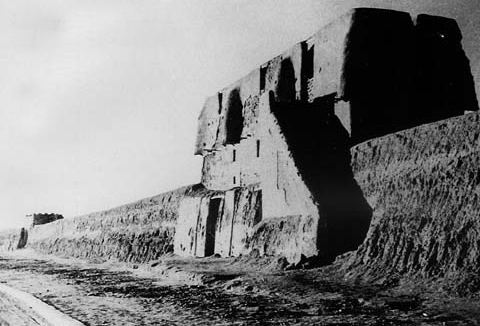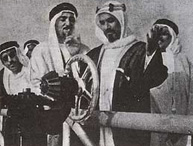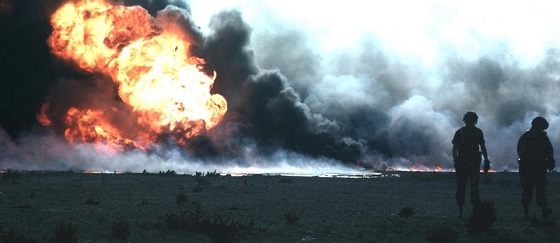Kuwait’s History:
The general opinion of most historians was that Kuwait's modern history began in the early 18th century, when several clans from the Al Aniza tribe migrated to the northern shore of the Gulf from the Najd, their famine-stricken homeland in central Arabia. These settlers combined to create an oligarchic merchant principality, whose economic prosperity was based on fishing, pearling, and trade. Eventually the Al Sabah emerged as the dominant clan, and were formally established as rulers in 1756. However, new pieces of evidence came to light which confirm Kuwait’s foundation in 1613, changing, thereby, Kuwait’s History. Some of these historical testimonies mention the year explicitly, others, indicate it implicitly.
In fact, at the beginning of the letter sent on 5th of March 1913 by Sheikh Mubarak AL-SABAH to the British Authorities to clarify the Kuwaiti borders, he says: “Kuwait is a deserted land where our grandfather settled down in 1613” (Click to view the original in Arabic). The same date is mentioned in the historical book of the author Mohamad Ben Othman. Moreover, the Colonel Billy wrote in his report dated of 16th of July 1863 about his visit to Kuwait: “The family of the recent Sheikh is governing Kuwait for five generations, which means for 250 years. Their generation lasts twice more than ours does". By subtracting 250 years from the date of the Colonel’s visit to Kuwait, the result is 1613, which coincides with the two above mentioned sources.
 Other historical facts prove the foundation of Kuwait in 1613, for examples, the transcription of the book of the Imam Malek for people who were living in Kuwait by Mussaed Ibn Ahmad Ibn Mussaed Ibn Salem, and the description of Kuwait by the traveler Morthada Ibn Alouane who visited Kuwait after his pilgrimage in 1708.
Other historical facts prove the foundation of Kuwait in 1613, for examples, the transcription of the book of the Imam Malek for people who were living in Kuwait by Mussaed Ibn Ahmad Ibn Mussaed Ibn Salem, and the description of Kuwait by the traveler Morthada Ibn Alouane who visited Kuwait after his pilgrimage in 1708.
Throughout the eighteenth and nineteenth centuries, the Al Sabah proved adept at the kind of maneuvering that was necessary for a small state to survive next to powerful Saudi, Rashidi, and Ottoman neighbors. By the late nineteenth century, however, fears of growing Ottoman influence led Sheikh Mubarak Al Sabah or "Mubarak the Great" (r.1896-1915) to enter into an agreement with Great Britain, which effectively established Kuwait as an autonomous British protectorate.
Under the 1899 agreement, Kuwait maintained control over its internal affairs, while Great Britain assumed responsibility for the country's security and foreign relations. The British also provided advisers to staff the country's nascent modern bureaucracy. Another British legacy is Kuwait's borders, which were established in 1922 and 1923. Iraq affirmed its border with Kuwait in its 1932 application to the League of Nations for membership as an independent state.
 In the mid-1930s work began on the development of Kuwait's petroleum industry, the basis of the country's modern prosperity. Oil was first discovered in Kuwait in 1938, but the development of the industry was interrupted by World War II. By 1945, drilling had resumed on a large scale, and the commercial export of crude oil began in June 1946. Oil production and revenues grew rapidly, fueling a dramatic expansion of the entire economy. By the 1960s Kuwait enjoyed a level of economic development that made it one of the richest states in the world on a per capita basis.
In the mid-1930s work began on the development of Kuwait's petroleum industry, the basis of the country's modern prosperity. Oil was first discovered in Kuwait in 1938, but the development of the industry was interrupted by World War II. By 1945, drilling had resumed on a large scale, and the commercial export of crude oil began in June 1946. Oil production and revenues grew rapidly, fueling a dramatic expansion of the entire economy. By the 1960s Kuwait enjoyed a level of economic development that made it one of the richest states in the world on a per capita basis.
On June 19, 1961 Kuwait gained full independence from Britain. Iraq initially refused to accept Kuwait's independence and threatened to annex its neighbor, falsely alleging that Kuwait had once been part of Iraq. Iraq's military threats resulted in a deployment of British troops, which were soon replaced by an Arab League force, and the crisis subsided. In 1963 Kuwait became a member of the United Nations, and later that year Iraq agreed to abandon its threats and recognize Kuwait's independence and borders in a treaty signed by both governments (although there were border clashes in 1973).
In the 1980s Kuwait's stability was shaken by the Iran-Iraq War, terrorist attacks in Kuwait City, and economic difficulties caused by a worldwide oil glut and the 1982 collapse of the country's unofficial stock market, the Suq Al-Manakh. Kuwait's sovereignty and continued existence were critically threatened when Iraq invaded and occupied Kuwait on August 2, 1990,  claiming that Kuwait was harming Iraq economically by refusing to reduce its oil production. Many Kuwaitis were forced to flee to Saudi Arabia and other countries. In Saudi Arabia, Kuwait set up a government in exile. As an international coalition of 30 states, led by the United States, prepared to reverse the occupation, Iraq announced it had annexed Kuwait, claiming again that Kuwait had been historically part of Iraq. The Iraqis were forcibly ejected at the conclusion of Operation Desert Storm on February 26, 1991. Departing Iraqi troops looted homes and businesses, and inflicted serious damage on Kuwait's oil industry and environment by setting ablaze 742 of its 1,080 oil wells and allowing crude oil to flow into the desert and the sea. They also took thousands of Kuwaiti prisoners with them.
claiming that Kuwait was harming Iraq economically by refusing to reduce its oil production. Many Kuwaitis were forced to flee to Saudi Arabia and other countries. In Saudi Arabia, Kuwait set up a government in exile. As an international coalition of 30 states, led by the United States, prepared to reverse the occupation, Iraq announced it had annexed Kuwait, claiming again that Kuwait had been historically part of Iraq. The Iraqis were forcibly ejected at the conclusion of Operation Desert Storm on February 26, 1991. Departing Iraqi troops looted homes and businesses, and inflicted serious damage on Kuwait's oil industry and environment by setting ablaze 742 of its 1,080 oil wells and allowing crude oil to flow into the desert and the sea. They also took thousands of Kuwaiti prisoners with them.
In November 1994, Iraq formally accepted Kuwaiti sovereignty as well as a UN-demarcated border. Nevertheless, Iraq has provided only partial compensation for property and environmental damage sustained during the occupation and has refused to comply with U.N. resolutions stipulating that Iraq repatriate all prisoners of war. Eight years after Kuwait's liberation, Iraq continues to hold 605 prisoners of war (of whom 570 are Kuwaiti citizens), many of whom were kidnapped from their homes or were arrested at random on the streets during the Iraqi occupation.
